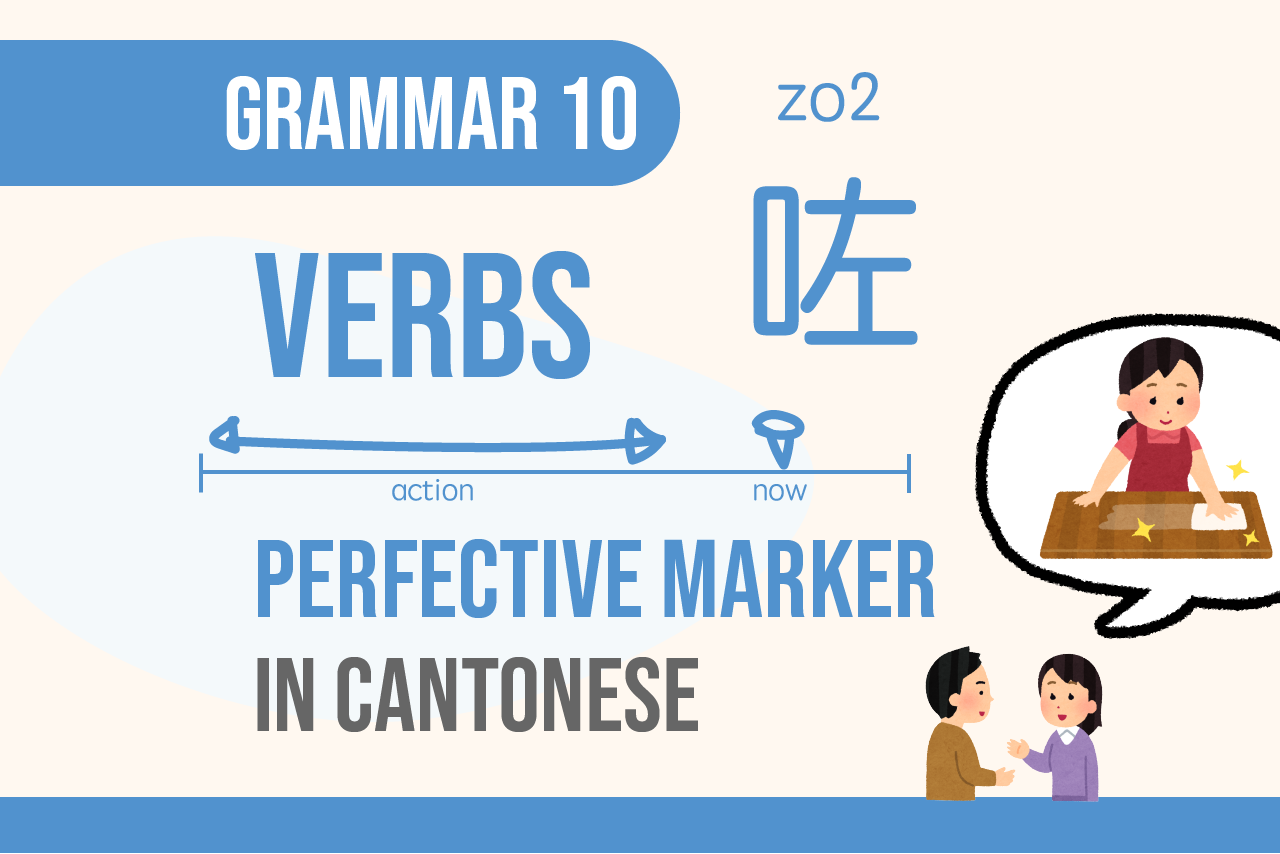Table of Content
To indicate completed actions or past events in Cantonese, we use the Subject-Verb-Object (SVO) structure and add the marker 咗 after the verb, , similar to how we use "have ~ed" or “~ed” in English.
The "chopped pattern of Verb-Object" is used, where the placement of 咗 is similar to 緊 in the continuous aspect. Revise where an aspect marker should be placed in Grammar09 - Verbs Continuous Marker 緊(gan2). Its Mandarin equivalent is 了, which is usually placed at the end of the sentence to indicate completed actions.
This marker can be applied to express past, past perfect, past perfect continuous, present perfect and present perfect continuous tense in English. The context and supporting words determine whether the action is present or past. For future actions, we do not typically use the perfective marker 咗 in Cantonese. Instead, we usually use 完 (the complete marker). We will talk about the usage of 完 in future lessons.
Single-Character Verbs
Transitive Verbs
【Subject - Verb - 咗 - Object】
(我叫外賣)
(I order food delivery.)我(尋日)叫咗外賣
I ordered food delivery (yesterday).我 (啱啱)叫咗外賣
I have ordered food delivery (just now).(佢唔見條鎖匙)
(He/She lose the keys.)佢(尋日)唔見咗條鎖匙
He/She lost the keys (yesterday).佢(啱啱)唔見咗條鎖匙
He/She has lost the keys (just now).(我買餸)
(I buy the ingredients for cooking.)我(前日)買咗餸
I bought the ingredients for cooking (the day before yesterday).我(啱啱)買咗餸
I have bought the ingredients for cooking (just now).(佢食早餐)
(He/She has(/eats) breakfast.)佢食咗早餐先走
He/She had had(/eaten) breakfast before he left.(我執間屋)
(I tidy the house.)我喺佢哋到之前執咗間屋
I had tidied the house before they arrived.我學廣東話
(I learn Cantonese.)我學咗廣東話兩年
I have been learning Cantonese for two years.我嚟香港之前學咗廣東話兩年
I had been learning Cantonese for two years before I came to Hong Kong.
Verbs with Complementing Noun
【Subject - [Verb - 咗 - Noun]】
("Verb-noun phrase" functions as a single verb. See Grammar08 - Verbs for more about "Verb-Noun" phrase and Grammar09 - Continuous Marker 緊 to revise where a verb marker should be placed.)
(我瞓覺)
(I sleep.)我(尋晚)瞓咗覺之後佢打俾我
He/She called me after I had slept (last night).
Double-Character Verbs
Separable Verbs
【Subject - [Separable Double-Character Verb] 】
【Subject - [Verb - 咗 - Noun]】
(你畢業)
(You graduate.)你畢咗業兩年
You have been graduated for two years.(我沖涼)
(I take a shower.)我沖咗涼
I have taken a shower.
Non-separable Verbs
【Subject - [Double-character Verb] - 咗】
(你考慮)
(You considers.)你考慮咗兩日
You considered / have considered / have been considering / had considered / had been considering for two days.(我堅持)
(I persist.)我堅持咗十年
I persisted / have persisted / have been persisting / had persisted / had been persisting for ten years.
Additional Note
Although 咗 can sometimes be applied to perfect tense in English, it does not mean that all perfect tense can be translated using 咗. Sometimes, 完 (completion marker), 過 (experience marker), etc., should be used. We will discuss these aspect markers in future lessons.
